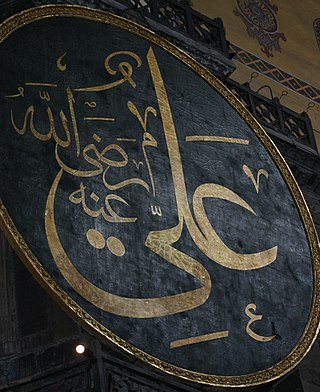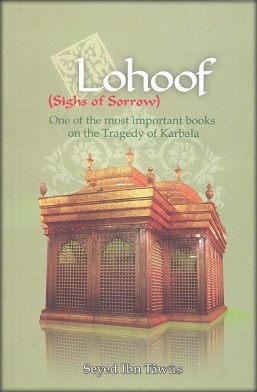
Husayn ibn Ali was a social, political and religious leader. The grandson of the Islamic prophet Muhammad and a son of Ali ibn Abi Talib and Muhammad's daughter Fatima, as well as a younger brother of Hasan ibn Ali, Husayn is regarded as the third Imam (leader) in Shia Islam after his brother, Hasan, and before his son, Ali al-Sajjad. Being the grandson of the prophet, he is also a prominent member of the Ahl al-Bayt. He is also considered to be a member of the Ahl al-Kisa, and a participant in the event of the mubahala. Muhammad described him and his brother, Hasan, as the leaders of the youth of Paradise.

The Battle of Karbala was fought on 10 October 680 between the army of the second Umayyad caliph Yazid I and a small army led by Husayn ibn Ali, the grandson of the Islamic prophet Muhammad, at Karbala, Sawad.

Ali ibn al-Husayn al-Sajjad, also known as Zayn al-Abidin was the great-grandson of the Islamic prophet Muhammad, and the fourth imam in Shia Islam, succeeding his father, Husayn ibn Ali, his uncle, Hasan ibn Ali, and his grandfather, Ali ibn Abi Talib.

Al-Abbas ibn Ali ibn Abi Talib, also known by the kunya Abu al-Fadl, was a son of Ali ibn Abi Talib, the fourth Rashid caliph in Sunni Islam and the first Imam in Shia Islam. His mother was Fatima bint Hizam, commonly known as Umm al-Banin. Abbas fought as the standard-bearer of his half-brother Husayn ibn Ali in the Battle of Karbala on 10 Muharram 61 AH against the army of the Umayyad caliph Yazid ibn Mu'awiya. He was killed in a desperate attempt to bring water from the Euphrates river to quench the unbearable thirst of the besieged family of the Islamic prophet Muhammad. Abbas is said to have inherited Ali's boldness and bravery, and was praised by Shia imams for his faith and fortitude in defending Husayn. Abbas is regarded by Shia Muslims as an ultimate paragon of courage and self-sacrifice. The shrine of Abbas and the nearby mausoleum of Husayn in Karbala are destinations for pilgrimage.
Umm Kulthūm bint ʿAlī, also known as Zaynab al-Ṣughrā, was the youngest daughter of Fatima and Ali ibn Abi Talib. The former was the daughter of the Islamic prophet Muhammad and the latter was his cousin. Ali is also recognized as the fourth Rashidun caliph and the first Shia imam. A young Umm Kulthum lost her grandfather and mother in 632 CE. While she was still a child, the second Rashidun caliph Umar ibn al-Khattab asked for her hand in marriage, which was resisted by Umm Kulthum and her father Ali, possibly due to Umar's reputation for harsh treatment of women. By one Sunni account, Ali finally agreed to the marriage when Umar enlisted the support of prominent Muslims for his proposal.
Zaynab bint Ali, was the eldest daughter of Fatima and Ali ibn Abi Talib. The former was a daughter of the Islamic prophet Muhammad, and the latter was his cousin. Ali is also recognized as the fourth Rashidun caliph and the first Shia imam. Zaynab is best known for her role in the aftermath of the Battle of Karbala, in which her brother Husayn and most of her male relatives were massacred by the forces of the Umayyad caliph Yazid ibn Mua'awiya. Women and children in Husayn's camp were taken captive after the battle and marched to Kufa and then the Umayyad capital Damascus, where Zaynab gave impassioned speeches, condemning Yazid and spreading the news of Karbala. She was later freed and died shortly afterward in 682, but her burial site is uncertain. The two shrines associated with Zaynab in Damascus and Cairo are destinations for Muslim pilgrimage. She is considered to be a symbol of sacrifice, strength, and piety in Islam, and a role model for Muslim women, typifying courage, leadership, and defiance against oppression.
Muslim ibn Aqil al-Hashimi was a relative of the Islamic prophet Muhammad. Muslim was the son of Aqil ibn Abi Talib and a cousin of Husayn ibn Ali, the third Shia Imam, who dispatched him to Kufa in Iraq to ascertain their support upon the accession of the Umayyad caliph Yazid. The Kufans welcomed Muslim and overwhelmingly pledged to support Husayn against the Umayyad rule, which they considered illegitimate and tyrannical. In response, Yazid replaced the mild governor of the city with his strongman Ubayd-Allah ibn Ziyad, who soon discovered the hideout of Muslim through an informant. When Ibn Ziyad imprisoned or killed Hani ibn Urwa, who was secretly sheltering Muslim, he came out in open revolt and surrounded the governor's palace with his supporters in September 680 CE. With a combination of threats and promises, however, Ibn Ziyad induced Kufan tribal leaders to abandon Muslim and withdraw their men. A deserted Muslim was arrested after a strong resistance and executed. Before this turn of events, he had written to Husayn and urged him to come to Kufa. Husayn thus left Mecca with his family and a few supporters, but his caravan was intercepted and massacred by the Umayyad forces in October 680 in Karbala, near Kufa. Muslim is revered in Shia Islam for his bravery and moral uprightness. His shrine in Kufa is a destination for Shia pilgrims.

Abd Allah ibn Ja'far ibn Abi Talib al-Hashimi was a companion and relative of the Islamic prophet Muhammad, a nephew of Ali, a half-brother of Muhammad ibn Abi Bakr and grandfather of Abd Allah ibn Mu'awiya.
Al-Qāsim ibn al-Ḥasan was the son of Hasan ibn Ali. He supported his uncle Husayn ibn Ali in fighting off the Umayyad forces during the Battle of Karbala where he was killed at the age of 13.
Ali al-Akbar ibn al-Husayn, commonly known as simply Ali al-Akbar, was the son of Layla bint Abi Murra and Husayn ibn Ali, the third Shia imam and the grandson of the Islamic prophet Muhammad. Aged between eighteen and twenty-five, Ali was killed at the Battle of Karbala in 680 CE, alongside his father and some seventy-two relatives and supporters, who fought against the army of the Umayyad caliph Yazid ibn Mu'awiya. In Shia Islam, Ali al-Akbar is commemorated as a brave youth martyred before he could marry, and celebrated for his striking resemblance, in appearance and manners, to his great-grandfather, the Islamic prophet Muhammad.
Abd-Allah ibn al-Husayn, also known as Ali al-Asghar, was the youngest son of Husayn ibn Ali, the grandson of Muhammad and the third Shia Imam. A young child, likely an infant, he was killed in the Battle of Karbala in 680 CE, alongside his father, family members, and a small number of supporters, all of whom were massacred by the forces of the Umayyad caliph Yazid, who first surrounded them for some days and cut off their access to the nearby river Euphrates. Abd-Allah is commemorated in Shia Islam as the quintessence symbol of the innocent victim.
Sakīna bint al-Ḥusayn, also known as Āmina, was a descendant of the Islamic prophet Muhammad. She was the daughter of Husayn ibn Ali, the third Shia Imam, and Rubab bint Imra al-Qais. Sakina was a young child in 680 at Karbala, where she witnessed the massacre of her father and his supporters by the forces of the Umayyad caliph Yazid. The women and children, among them Sakina, were marched to the capital Damascus, where they were paraded in the streets and then imprisoned.

Fāṭima bint Ḥuzām, better known as ʾUmm al-Banīn, was a wife of Ali ibn Abi Talib, the fourth Rashidun caliph and the first Shia Imam. She belonged to the Banu Kilab, a tribe within the Qays confederation. Umm al-Banin married Ali sometime after the death in 632 of his first wife Fatima, daughter of the Islamic prophet Muhammad. She bore Ali four sons who were all killed in the Battle of Karbala (680).
Ruqayya bint al-Ḥusayn is said to have been a daughter of Husayn ibn Ali, the third imam in Twelver Shia. Husayn and a small group of his supporters were massacred in the Battle of Karbala in 680 CE on the order of the Umayyad caliph Yazid. Their women and children were then taken captive and marched to the capital Damascus, where it is said that Ruqayya died at the age of about three, possibly due to the hostility of her captors. The shrine associated with Ruqayya in Damascus is a popular destination for Shia pilgrimage. The child of Husayn who died shortly after Karbala is sometimes identified as Sakina.
Rubāb bint Imraʾ al-Qays was the first wife of Husayn ibn Ali, the third Shia Imam. After some years of remaining childless, she bore Husayn two children, named Sakina and Abd-Allah, also known as Ali al-Asghar. Rubab was present at Karbala in 680 CE and witnessed there the massacre of her husband and his supporters by the forces of the Umayyad caliph Yazid. Also killed there was Ali al-Asghar, who was at the time a young child, likely an infant. The women and children, among them Rubab, were marched to Kufa and then the capital Damascus, where they were paraded in the streets and then imprisoned. They were later released and returned to their hometown of Medina. Rubab refused to remarry after Husayn and died about a year later in Medina. Some elegies are ascribed to her in memory of Husayn.

Sunni Muslims and Shia Muslims agree on the three holiest sites in Islam being, respectively, the Masjid al-Haram, in Makkah; the Al-Masjid an-Nabawi, in Medina; and the Al-Masjid Al-Aqsa, in Jerusalem.
Sakhr ibn Harb ibn Umayya, commonly known by his kunyaAbu Sufyan, was a prominent opponent-turned companion and father-in-law of the Islamic prophet Muhammad. He was the father of the first Umayyad caliph Mu'awiya I and namesake of the Sufyanid line of Umayyad caliphs which ruled from 661 to 684.
The Sermon of Ali ibn Husayn in Damascus are the statements of Ali ibn Husayn in the presence of Umayyad caliph Yazid I. After the Battle of Karbala, the captured family of Muhammad, the Islamic prophet, and the heads of those killed were moved to the Levant by the forces of Yazid. By order of Yazid, a pulpit was prepared, and a public speaker gave a lecture that placed blame on Ali and Husayn ibn Ali. In reply to the Yazid's speaker, Ali Ibn Husayn introduced himself and his descendants. Also, he recounted the events leading to the death of Husayn ibn Ali.

Lohoof is a book by Sayyed Ibn Tawus, a Shia jurist, theologian, and historian. It is kind of Maqtal al-Husayn, narrating the Battle of Karbala, the death of Husayn ibn Ali, and subsequent events.









